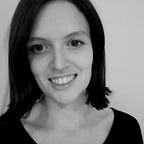The Business of Writing:
3 Strategies to Write and Publish Your Debut Novel From Anna Bruno, Author of Ordinary Hazards.
Anna Bruno’s life dovetails with Emma’s, the thirty-something protagonist of her poignant debut novel Ordinary Hazards. In 2013, she decided to quit her job in Tech and become a writer. She met with her former Stanford professor, Tobias Wolff, for advice. Wolff urged her to follow her dream. “Advice like that is a gift from someone like Tobias Wolff,” she reflected. Wolff inspired Anna to apply for The Iowa Writers’ Workshop, where she completed her MFA. Like her protagonist Emma, she did not return to the “big city.” Anna teaches at the Tippie College of Business and lives in Iowa with her husband, two sons, and blue heeler.
A few days ago, I sat down with Anna to ask her about her experience writing and publishing Ordinary Hazards. Here are three things I learned from our conversation:
The Process is Messy
As an aspiring author wading my way through writing my first novel, I was relieved to hear Anna say: “My process is pretty messy.” At The Iowa Writers’ Workshop, Anna was taught to dive in, start writing scenes, and let the characters develop from there. “The outline comes after the work of writing the initial draft,” she said. Anna finds that if she adopts this exploratory approach, “the characters create themselves organically.” In the re-write, Anna adds structure to the story.
Focus on Beginnings, Endings, and Transitions
Emma teaches her students in Ordinary Hazards to focus on “beginnings, endings, and transitions.” I asked Anna what this advice meant to her personally. In a business presentation, Anna tells her students that you will have the audience’s attention at the beginning and the end. In the middle, you tend to lose your audience; people start checking their phones, answering emails, wondering what is for dinner…I’m thinking pasta, you?
A trick to keep the audience’s attention is to “create the feeling of beginning and endings while you are still in the middle.” Anna feels this lesson in the importance of transitions applies to fiction writing as much as business presentations — and I’m thinking blogs as well. Anna’s advice to aspiring authors was to “pay attention to how the writer regains the readers’ attention” throughout the story.
There is a Point Where You Just Need Access
Writing a novel is one thing (a hard thing!), but getting it published is another. Anna’s writing career to date reflects this. Anna secured an agent after her MFA, and she had a novel that was “on submission” for months but never actually sold to a publisher. Some writers may have, understandably, become demotivated at this point. However, Anna was already deep into writing Ordinary Hazards when the decision was made not to move forward with the first novel. “It has been essential to my process always to have the next project lined up,” she said. For Anna, having another project on the go helps relieve the stress and anxiety embedded within publishing a novel.
“Finding the agent is key to getting published; they are the gatekeepers,” Anna said. Some professors on her MFA encouraged the students not to worry about the business of getting published. They advised students to focus entirely on crafting a masterpiece: the build it, and they will come mentality. While Anna felt that it was good advice to focus on writing the best novel or collection of short stories you can, she remarked: “there is a point where you just need access, access to agents and publishers.” For Anna, The Iowa Writers’ Workshop opened the doors to her getting her agent. Recognizing that an MFA is not going to be the right choice for everybody, Anna advised going to writers’ conferences and networking to gain access to literary agents. At business school, students are taught to try to find a job through networking. Similarly, she recommended that aspiring authors seek out that “friend who knows a friend who knows an agent.” Ultimately Anna said, writers “need both a brilliant piece of work and some kind of access” to the industry to get published.
You can read my review of Ordinary Hazards @pollyturnsthepage on Instagram. If you are interested in buying a copy of the novel, check out Anna Bruno’s website for information on where to purchase Ordinary Hazards.
This blog aims to demystify the writing process and share my personal takeaways from conversations with authors. I would love to hear your thoughts and questions about writing in the comments.
Disclaimer: All views expressed in this personal blog are solely my own unless explicitly stated otherwise. This blog intends to spotlight authors and their books. The personal writings in this blog do not intend to defame, injure, or harm anyone. I would love to hear your thoughts on the topic discussed in the comments, but please know that I am not responsible for the content of any comments. The writer of a comment is solely responsible for the comment’s content. Please contact me directly if you would like any content edited or removed because you believe it harmful, unnecessary, or sensitive.
